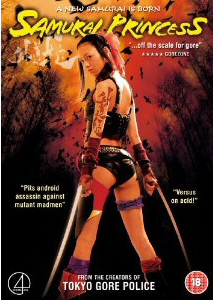
(aka Samurai purinsesu: Gedô-hime)
Say what you like about Japanese filmmakers, they sure know how to grab your attention with those opening scenes of theirs (Suicide Circle, anyone?) So it was with a great deal of enthusiasm that I sat down to Samurai Princess - by the screenplay writer of the excellent, highly silly Tokyo Gore Police - and beheld, in the first few frames, a cyborg-samurai girl detaching her breasts, combining them to make a missile, and using them to split open an assailant's skull! However, such a promisingly splattertastic start sets the bar very high, and although this film doesn't lack entertainment value, it sadly fails to live up to, err, the sum of its parts.
The action takes place in a parallel-universe Japan, a world where a ragtag outlaw class co-exist with an army of frequently-wicked 'androids', modified dead bodies who use their super-strength and in-built weapons for nefarious ends. That's not to say that the unmodified human inhabitants of the Forest of Infinity behave themselves with decorum; there's a rogue group of modern artists afoot, who rape, kill and mutilate the population to create unspeakable sculptures out of whatever's left. Our Samurai Princess (adult-movie actress Aino Kishi) became a modified being after barely surviving an encounter with these artists, one which left all 11 of her female companions dead. When she was discovered lying in the forest by a Buddhist nun and, as luck would have it, a scientist called Kyoraku who builds androids, she begged for the opportunity to - you've guessed it - go out looking for vengeance against the perpetrators. So, Kyoraku rebuilds her, the nun installs the 11 souls of her fallen companions, and she sets off on her mission.
Along the way she tags along with another modified outlaw, Gekko, and away they go - except that Gekko would rather a piece of Kyoraku, seeing as his modification experiments on his sister drove her insane…
Strangely then, the Princess ends up pursuing the man who rebuilt her so she could get her vengeance in the first place, albeit stopping along the way for some protracted battles with other bionic beings. She omits to chase nearly all the people you'd expect (possibly in expectation of a sequel?) and if the plot summary above sounds nonsensical, even what you see here took some intense concentration on this reviewer's part! Admittedly, no film about bands of outlaws and androids living in a mythical forest is ever going to be a realist piece of work, but - somehow, the completely slapdash development of plot elements prevents the film from really hanging together well. The main thrust of the film feels stilted, and as equally nonsensical as Tokyo Gore Police is, I felt it had more of a sense of plot and pace, as well as greater enjoyment in the humour of the set-up.
That said, if its visual effects and not a story you're after, then there is certainly enough here to satisfy you gore fiends, that is, if you're not vehemently anti-CGI. As in Tokyo Gore Police we have an abundance of severed limbs being replaced with nasty weapons, some skull crushing, a killer modified penis and, in a novel development, a woman who uses a piece of maggoty intestine as a whip. There's a sort of childlike delight in pulling bodies apart like they were insects in this film and many others like it - as well as plenty of the high-gore, high-colour, arterial-spraying body horror you'd expect in a film which helps show the huge crossover between cartoon and motion picture in Japanese culture.
So, there are some fun moments in Samurai Princess, plenty of laugh-out-loud blood and guts, and even some censor-cheating near-explicitness, but despite all of that in its favour it seems to struggle to carve out its own identity, especially up against such a plethora of other warped body-horror competitors.
On the 4 Digital Asia release contains a 22-minute 'Making Of' featurette, including interviews with Aino Kishi (and a fair bit of additional nudity from Ms. Aino!) director Kengo Kaji and special effects and make-up director Yoshihiro Nishimura, 'Gekko' actor Dai Mizuno, the whip-wielding actress Mihiro and her artist-partner Shachi, played by Kentarô Shimazu. There's also the original Japanese trailer and a generous 11 4Asia trailers: 20th Century Boys 1 and 2, Death Note, Death Note: The last Name, Death Note: L Change The World, Tokyo Gore Police, Meatball Machine, X-Cross, Yo Yo Girl Cop, Black Kiss, and Starfish Hotel. There's also a weblink.
Obviously the film was made on something of a budget, but the picture quality is decent: the Dolby Digital sound is clear and the film is presented in a 16:9 aspect ratio.
Review by Keri O'Shea
| Released by 4Digital Asia |
| Region 2 - PAL |
| Rated 18 |
| Extras : |
| see main review |